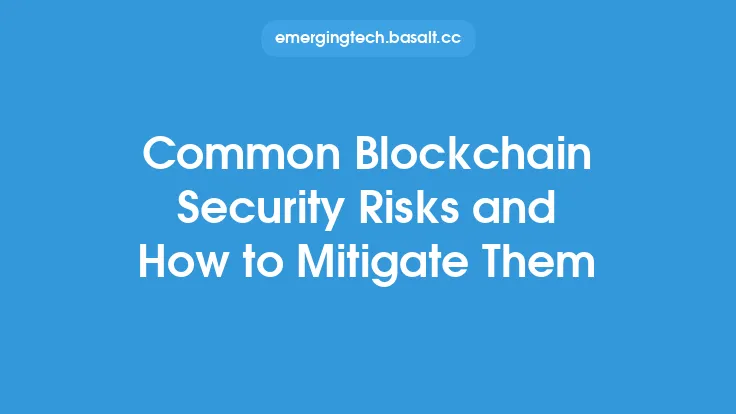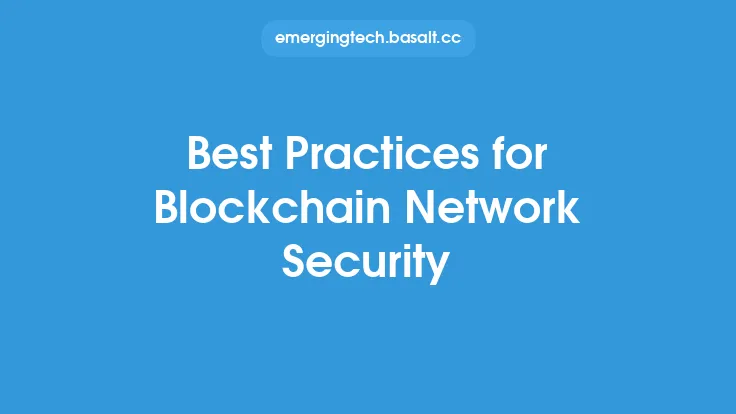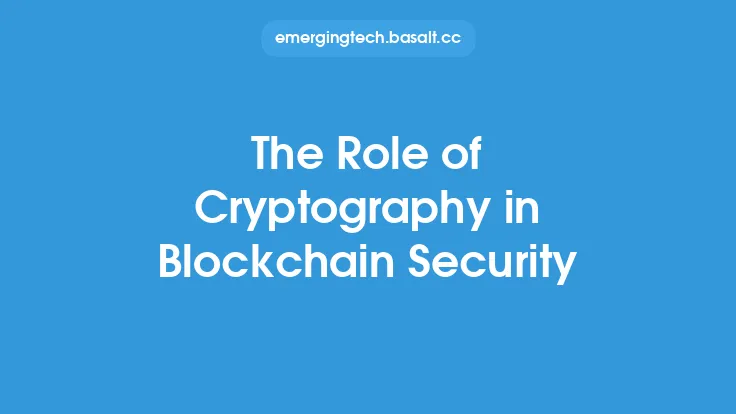The blockchain ecosystem has grown exponentially over the years, with numerous applications and use cases emerging across various industries. As the adoption of blockchain technology continues to increase, the need for robust security measures has become more pressing than ever. One crucial aspect of ensuring the security and integrity of blockchain-based systems is the conduct of regular security audits. In this article, we will delve into the world of blockchain security audits, exploring their importance, benefits, and key considerations.
Introduction to Blockchain Security Audits
Blockchain security audits are comprehensive reviews of a blockchain-based system's architecture, code, and configurations to identify potential vulnerabilities and weaknesses. These audits are designed to assess the overall security posture of a blockchain network, smart contract, or decentralized application (dApp), and provide recommendations for remediation and improvement. By conducting regular security audits, organizations can proactively identify and address potential security risks, reducing the likelihood of exploits and attacks.
Types of Blockchain Security Audits
There are several types of blockchain security audits, each with its own specific focus and scope. Some of the most common types of audits include:
- Smart contract audits: These audits focus on reviewing the code and functionality of smart contracts to identify potential vulnerabilities and bugs.
- Network audits: These audits assess the security of a blockchain network, including its architecture, node configuration, and communication protocols.
- dApp audits: These audits review the security of decentralized applications, including their user interfaces, APIs, and backend systems.
- Penetration testing: This type of audit involves simulated attacks on a blockchain-based system to test its defenses and identify potential vulnerabilities.
Benefits of Blockchain Security Audits
Conducting regular blockchain security audits offers numerous benefits, including:
- Improved security posture: Audits help identify and address potential vulnerabilities, reducing the risk of exploits and attacks.
- Enhanced user trust: By demonstrating a commitment to security, organizations can build trust with their users and stakeholders.
- Regulatory compliance: Audits can help organizations comply with relevant regulations and standards, such as GDPR and HIPAA.
- Cost savings: Identifying and addressing vulnerabilities early on can save organizations significant costs and resources in the long run.
Key Considerations for Blockchain Security Audits
When conducting a blockchain security audit, there are several key considerations to keep in mind. These include:
- Audit scope: Clearly defining the scope of the audit is crucial to ensure that all relevant systems and components are reviewed.
- Audit frequency: Regular audits are essential to ensure that a blockchain-based system remains secure over time.
- Audit tools and techniques: Utilizing the right tools and techniques is critical to identifying potential vulnerabilities and weaknesses.
- Audit reporting: Providing clear and concise reporting is essential to ensure that audit findings are actionable and effective.
Best Practices for Blockchain Security Audits
To ensure the effectiveness of a blockchain security audit, several best practices should be followed. These include:
- Engaging independent auditors: Independent auditors can provide an unbiased and objective assessment of a blockchain-based system's security.
- Utilizing industry-recognized standards: Adhering to industry-recognized standards, such as the OWASP Top 10, can help ensure that audits are comprehensive and effective.
- Conducting regular training and awareness programs: Educating developers and users about security best practices can help prevent vulnerabilities and weaknesses.
- Implementing audit recommendations: Acting on audit findings and implementing recommended remediations is critical to ensuring the security and integrity of a blockchain-based system.
Challenges and Limitations of Blockchain Security Audits
While blockchain security audits are essential for ensuring the security and integrity of blockchain-based systems, there are several challenges and limitations to consider. These include:
- Complexity: Blockchain-based systems can be complex and nuanced, making it challenging to conduct comprehensive audits.
- Scalability: As blockchain-based systems grow and scale, auditing them can become increasingly difficult.
- Evolving threats: The threat landscape for blockchain-based systems is constantly evolving, making it essential to stay up-to-date with the latest threats and vulnerabilities.
- Limited expertise: Conducting effective blockchain security audits requires specialized expertise and knowledge, which can be limited in some cases.
Conclusion
Blockchain security audits are a critical component of ensuring the security and integrity of blockchain-based systems. By conducting regular audits, organizations can proactively identify and address potential vulnerabilities and weaknesses, reducing the risk of exploits and attacks. While there are challenges and limitations to consider, the benefits of blockchain security audits far outweigh the costs. As the blockchain ecosystem continues to evolve and grow, the importance of robust security measures, including regular security audits, will only continue to increase.





